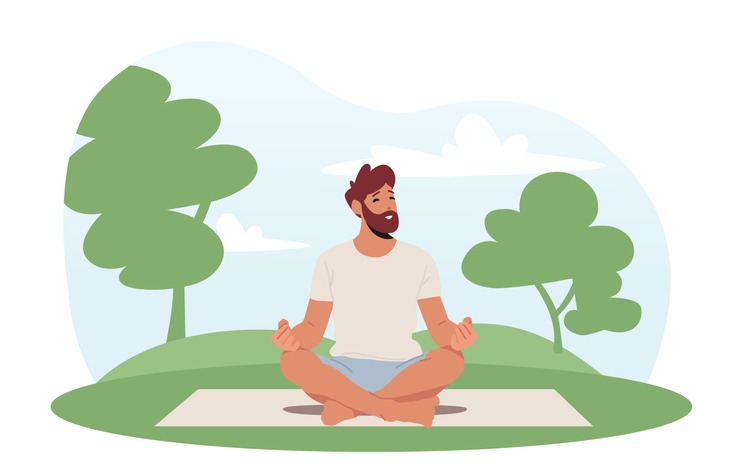
We all talk about the importance of self-care, but do any of us actually practice it in our day to day lives? Here are self-care ideas that stick
CREDIT: This is an edited version of an article that originally appeared on Headspace
What is self-care really about? It’s simply the time we take to look after our mind and body. Self-care is also deeply personal. It’s specific to what each of us needs and what fits into our routines: a morning walk in the fresh air, a warm bath after a long day, a deep breath before a meeting. There’s no right or wrong way to do self-care.
But how do we practice self-care regularly when life gets in the way? Maybe we’re too busy, too exhausted, too focused on others to quite literally give ourselves a break. As it turns out, when there’s more going on in our life, that’s when we need our self-care practices the most.
It’s not just during tough times that self-care can benefit us, either. An established practice can help us enjoy the good times to their fullest potential or help us relieve stress. So, let’s take a look at how to create a self-care plan that actually sticks. We’ll use mindfulness to help us identify what we can do to feel our best, no matter what life throws our way.
The benefit of self-care practices
Many of us know what it feels like when we neglect our well-being. Our body or mind eventually forces us to stop. Maybe we’ve been skipping the daily stretches that help us get through a workout and we get injured.
Or maybe we’ve been working overtime without the rest our body needs and we lash out at someone close to us. When we aren’t taking good care of ourselves, we don’t feel our best or interact with others at our best.
Rather than view self-care as a nice-to-have or an indulgence, an internet trend or something only reserved for Sundays, we can look at this practice as part of our ongoing mental health self-care. As mental health experts note, we’re not paying attention to ourselves in a self-centred, narcissistic way, but in a way that makes sure we’re being cared for — for us and by us — by taking time to do things that help us live well and improve our health.
Headspace meditation teacher Dora Kamau shares, “As human beings, we all have needs. We all have things that are truly important to us and create a sense of safety. When we don’t have our needs met, this can bring us to a place of frustration, anger, and distress.” The time we dedicate to self-care is just as important as everyone else’s time. When we make a point to nurture ourselves, we can care for others in a more meaningful and compassionate way, too.
How to start a self-care plan that sticks
A lot of self-care advice is focused on lists of things to do. But before we jump into list making, it can be helpful to remind ourselves of self-care essentials: compassion for ourselves, knowing our boundaries, and bringing that sense of awareness with us as we approach the world.
We can use mindfulness to help us develop these essentials, as well as to build one of the most important habits in self-care: to listen to our mind and body. If we speak to and treat ourselves gently and with kindness for whatever we need in that moment, we can be more honest with ourselves about what self-care ideas support us best.
By approaching ourselves without judgment and practicing self-compassion, we might realise the self-care we’ve enjoyed in the past may not be helpful this time around. On the other hand, we might never have been drawn to certain self-care ideas until this very moment.
There are a few more basics that are fundamental to our well-being: eating, resting, and moving our body. Especially in difficult times, these essential practices are all the more important to help us feel our best. If we’re not starting from a healthy place, we can’t move on to discover new self-care practices that may benefit us.
So maybe today, that means we need to work on one of these key areas first: focusing on mindful eating to take the time to be present while we nourish our body; ensuring that we’re getting enough rest, both when we close our eyes at night and when we recognise that our body needs a break; and exercising if and how we’re able to, whether that’s regular workouts or stretching at home.
If we’re set with the fundamentals, that’s reason enough to celebrate an important self-care practice that we’ve already established. And if we’re ready to add more, the care can continue.
Three self-care practices to try
Remember the ‘self’ in self-care. We each come to it with our own perspective, and it’s not a one-size-fits-all kind of practice. Still, we can try these self-care ideas if we’re looking for a place to start experimenting until we find what works for us.
Meditation
Yes, it’s an obvious one, but it’s worth a reminder if it’s not already part of our self-carepractice, or what we consider to be self-care. The benefits of meditation are well-known: reduced stress and anxiety, and increased focus and positive emotions.
So, when we sit in the present moment without judgment, we’re also taking time to care for our mind and in turn, ourselves.
Play
Many of us lose a sense of fun and play as we grow older, but it can be freeing and even connect to improved physical health. Research also shows that laughing is linked to reduced stress, tension, and anxiety, suggesting that it’s a valid form of self-care all on its own.
Gratitude
The simple act of writing one or two things we’re grateful for each day can help us avoid getting caught up in life’s frustrations and recognise instead that we’re grateful for all that we do have. We might also find that when we take the time to make gratitude a part of our self-care routine, we can be grateful for that routine itself.



Be the first to comment